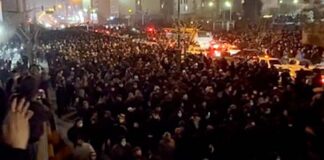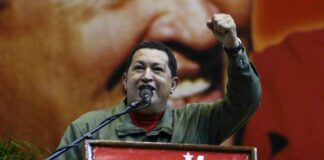NATO began a massive new offensive in Afghanistan in February when 15,000 troops began an assault on the southern provincial town of Marjah. Operation Moshtarak is the biggest offensive since the 2001 and after two weeks of heavy fighting NATO commanders were claiming victory.
As Solidarity goes to press, NATO commanders are planning an assault on Kandahar, Afghanistan’s second largest city.
Operation Moshtarak and the coming assault on Kandahar are an integral part of Obama’s “surge” strategy for dealing with the insurgency. Obama has effectively doubled the number of US troops in Afghanistan since coming to office, while his NATO allies have committed an extra 10,000 troops.
The air war, too, has escalated dramatically. The number of strikes between January and October last year jumped by 39 per cent while the number of bombs dropped per month more than quadrupled.
Meanwhile the cost has climbed from $37 billion in 2007 to over $100 billion this year. The Afghan war is now Obama’s war.
All of the extra troops and resources thrown at Afghanistan have done nothing to break the insurgency or bring peace. More civilians were killed last year (2412) than any other year, while many more had their lives shattered. NATO’s recent assault on Marjah forced over 10,000 refugees to flee to the provincial capital Lashkargah, while the number of Afghan refugees fleeing the north to Tajikistan is rising.
Resistance
Last year, too, was the worst for NATO casualties (over 500), but still the insurgency gets stronger. In November the Taliban had a “permanent presence” across 80 percent of Afghanistan—up from 72 percent on the year before.
A number of factors are driving the insurgency. First and foremost is the backing the NATO powers give to the corrupt Karzai government. It is widely acknowledged that he and his warlord allies stole last year’s presidential election using thuggery and “widespread fraud”.
Secondly the occupying powers have failed to improve people’s lives. Sixty per cent of Afghanis live on less than one dollar a day and millions of refugees wallowing in Iran and Pakistan can see no reason to return.
Civilian casualties from NATO air strikes, too, don’t help. More than 359 died last year—the worst year yet. The more firepower Obama throws at Afghanistan the more people suffer. Already NATO has had to apologise on three separate occasions this year for air strikes that wiped out civilians.
Obama’s war is becoming increasingly unpopular at home. The farcical Afghan presidential elections—combined with rising US casualties—saw support fall to an all time low of just 39 per cent. While support has since recovered, a majority still oppose the war.
In December Obama made a vague promise to start withdrawing troops in July 2011. This was an attempt to reassure the public the war wasn’t endless. The very next day, however, General Stanley McChrystal was saying the timetable wasn’t “absolute”.
Internationalising the conflict is another attempt to reassure the public. Unlike Bush, Obama consults his allies and asks them to carry more of the load. The allies, however, aren’t falling over themselves to commit more troops. They too face growing public scepticism. It was public opposition to the war that forced the recent collapse of the Dutch government and the end of their troop commitment to Afghanistan.
The London Conference on Afghanistan—convened by the British government in January—was another attempt to deal with public unease.
Needing to look decisive the leading powers came up with a carrot and stick approach to “degrade” (not defeat) the Taliban. The stick was the deployment of extra troops to retake the country “province by province”, while the carrot was the establishment of a trust fund to bribe sections of the Taliban to change sides. Once the provinces are retaken, the plan is to hand over security to a vastly expanded Afghan army, while a “civilian surge” would provide better governance.
These plans are unlikely to succeed. Firstly, the more firepower Obama commits, the more mayhem he causes, turning people against the occupation. Secondly, the Karzai government has no legitimacy. The NATO powers back him, however, because there is no credible alternative.
Thirdly, the Afghan security forces are in no shape to take over security. Ninety per cent of the army recruits are illiterate and only join out of financial desperation, while drug addiction and corruption are serious problems in the police force. Finally, the Taliban can see the occupation has problems and will more than likely bide their time. Meanwhile the instability in Afghanistan spreads across the border into Pakistan. Obama’s war is fast becoming Obama’s crisis.
By Mark Gillespie





